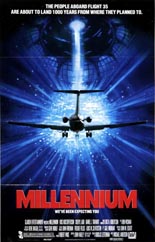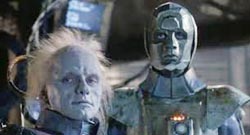
 Decades after being Oscar-nommed way back in 1956 for Around the World in Eighty Days, director Michael Anderson sunk his claws into a literary property and fashioned it into a modern sci-fi classic. I speak of Logan’s Run, of course, because his late-career Millennium is a low-flying turd. Despite arriving at the tail end of the ’80s, the shiny movie has its feet planted firmly in the style of the previous decade, in which Logan’s Run and Anderson’s made-for-TV Martian Chronicles were born. The most telling example is its out-of-vogue touch in casting, with Kris Kristofferson and Cheryl Ladd in the leads — neither a box-office sparker. (Don’t get me started on Daniel J. Travanti.)
Decades after being Oscar-nommed way back in 1956 for Around the World in Eighty Days, director Michael Anderson sunk his claws into a literary property and fashioned it into a modern sci-fi classic. I speak of Logan’s Run, of course, because his late-career Millennium is a low-flying turd. Despite arriving at the tail end of the ’80s, the shiny movie has its feet planted firmly in the style of the previous decade, in which Logan’s Run and Anderson’s made-for-TV Martian Chronicles were born. The most telling example is its out-of-vogue touch in casting, with Kris Kristofferson and Cheryl Ladd in the leads — neither a box-office sparker. (Don’t get me started on Daniel J. Travanti.)
Credit screenwriter John Varley, on whose 1977 “Air Raid” short story the film is based, for at least getting these miserable 108 minutes off the ground quickly; the commercial plane crash that sets the story into motion (as it were) happens within the first two minutes. With mass casualties and mysterious circumstances surrounding the wreckage, NTSB investigator Bill Smith (Kristofferson, the Blade trilogy) is sent to, um, investigate. Catching his (beady) eye is Louise Baltimore (Ladd, TV’s Charlie’s Angels), a rather fetching blonde airline attendant who, in actuality, is from a barren population 1,000 years in the future.
 What Ms. Baltimore (the fakest of fake names) is doing there and why she does it with Mr. Smith (the most generic of generic names) isn’t 100 percent clear — although Stargate clearly owes a great deal to Millennium — but you’ll be too distracted by Anderson’s wacky, wonky vision of tomorrow to care: Louise and her cohorts operate from an industrial hangar run partially by an Erector Set robot named Sherman (Robert Joy, Amityville 3-D). In this world, Ladd’s hair is fashioned into a Mohawk, like a soccer-mom Grace Jones, and everybody debates time travel, dropping the word “paradox” as often as “the.”
What Ms. Baltimore (the fakest of fake names) is doing there and why she does it with Mr. Smith (the most generic of generic names) isn’t 100 percent clear — although Stargate clearly owes a great deal to Millennium — but you’ll be too distracted by Anderson’s wacky, wonky vision of tomorrow to care: Louise and her cohorts operate from an industrial hangar run partially by an Erector Set robot named Sherman (Robert Joy, Amityville 3-D). In this world, Ladd’s hair is fashioned into a Mohawk, like a soccer-mom Grace Jones, and everybody debates time travel, dropping the word “paradox” as often as “the.”
If you feel a bit sleepy as Millennium drags on, Kristofferson is right there with you. (Ladd, for the record, impresses.) Whether his character is ordering coffee, surveying a disaster, squeezing tit or saving mankind, the actor exhibits his go-to move: the vacant stare. Among the leading men of his time, Kristofferson may be the least expressive of all. Being saddled with him as the hero in a would-be sci-fi epic is as aggravating as the baffling ending. As it unfolds and sits there, we hear Sherman’s omnipotent voice echo and boom and Zardoz-ize as if saying Something Meaningful: “This is not the end. This is not the beginning of the end. It is the end of the beginning.” It is an abortion. —Rod Lott
